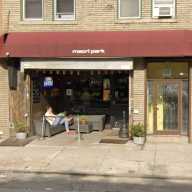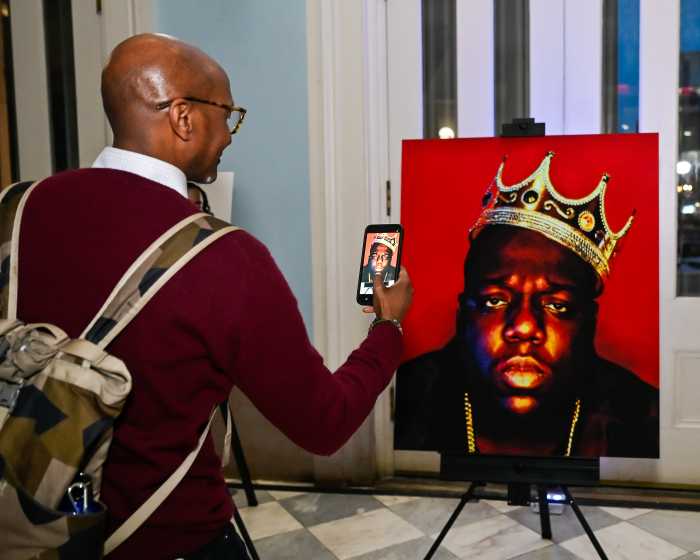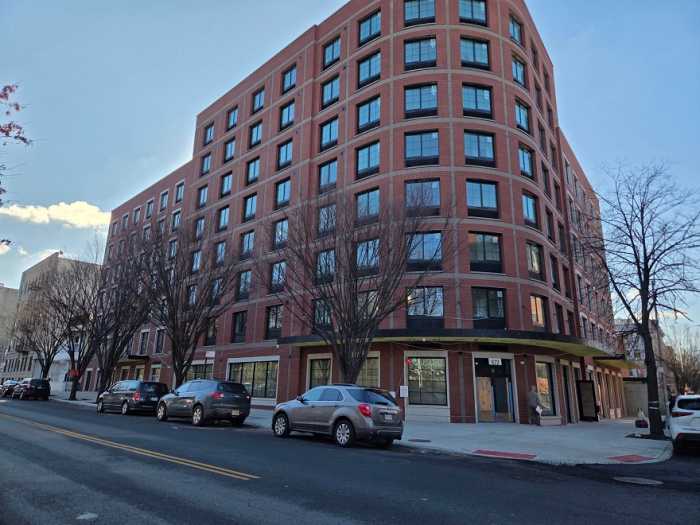Howie Katz on politics, changing the world, and realizing a life goal
“I always say that the difference between the inside players and the activists in the streets was the clothes we were wearing that day,” recalled Howie Katz of his early days as an activist, both with ACT UP and the Human Rights Campaign Fund in the late ‘80s in New York. “That’s not entirely the case, but it was for a number of people.
Indeed, in his early days as an activist, it was true for Katz. Having come out as an activist just months before at one of ACT UP’s first meetings in the Spring of 1987, he headed down to Washington for a June demonstration at the Reagan White House, at which he “chose to get arrested.” En route from New York to the capital, he learned he was the only one on his bus planning to do so. He was among the 60 or so AIDS activists hauled off to jail that day by Washington police protecting themselves with bright yellow plastic gloves.
HOWIE KATZ
Focused on seeing an issue through But for most of the 15 years since that time, Katz has pursued what could safely be termed an insider’s strategy, with jobs for the State Assembly and Senate, the Gay and Lesbian Anti-Violence Project, as an aide in 2001 to mayoral hopeful Freddy Ferrer, as director of the New York regional office of the Jewish Anti-Defamation League (ADL), and now as director of national outreach for American Jewish World Service, a philanthropic group headed by Ruth Messinger.
But to say that Katz has been an insider, in fact an insider gifted with what others say are unique political skills, is not to suggest that he became the embodiment of characteristics often faulted by street activists –– too easily given to compromise, co-opted by the system, or ultimately more concerned with career than with a cause.
In fact, in the decade beginning in 1990, Katz cobbled together a series of six different jobs that he saw as an opportunity to advance what became for him a “life goal” –– passage of a New York State hate crimes law that includes protections for victims of homophobic violence and harassment. To those who helped make that law reality in 2000, Katz’s role was absolutely key.
“It was clear to anybody who worked on the hate crimes bill that Howie, if not the heart and soul of the effort, was a really critical agent of change,” said Diane Steinman, who heads up the New York office of the American Jewish Committee. “His political skills are really quite remarkable.”
“His leadership on the hate crimes issue in New York was something that stood out in a crowd of standouts,” said Elizabeth Coleman, who worked with Katz at ADL as national civil rights director and now runs the New York State Trial Lawyers Association.
Ed Sedarbaum, a gay activist who worked on hate crimes with Katz over a number of years, including at ADL, and now heads up the Loft, Westchester’s LGBT community center, spoke specifically about the choices Katz made about career and cause.
“I can’t think of anyone else in our community who has taken a single issue and worked on it with such focus in order to see it through,” Sedarbaum said. “His career choices were very specifically made in light of the bill.”
Katz’s last three and a half years of work on the hate crimes bill were at ADL, first as associate director and later as director of the New York regional office. The man who had been a gay activist for nine years was now a Jewish activist, and from that position he was able to solidify the cooperation of two of the communities who fought hardest to win hate crimes legislation. (People of color communities also played a critical role, especially in the bill’s early years in the wake of the infamous 1986 murder of one black man and brutal beating of a second by a white mob in Howard Beach.)
But, within months of the hate crimes law’s signing in the summer of 2000, Katz began to think it might be time to move on from ADL. By early 2001, he was increasingly aware of differences between his thinking as an activist and the institutional constraints of the ADL, a large national organization that seeks support across a wide swath of the Jewish community.
Katz was also facing something of a depression. At the end of 2000, his longtime friend Peter Pappas, who had been his lover for seven years in the ‘80s, died of AIDS. And Katz also recognized that the culmination of a decade of work on hate crimes left a void.
“Somebody told me that when you spend your life trying to reach a goal and then you achieve it, you feel a letdown,” he said. “That was definitely part of it.”
By April of 2001, Katz was working for Bronx Borough President Freddy Ferrer, playing a key advisory role in his run for the Democratic nomination for mayor, and hoping to counter the famous assertion made by Giuliani insider Bruce Teitelbaum, in Jewish Week, that Ferrer as mayor, would be bad for the Jews.
Ferrer’s race, while dramatic, in the end came up just a bit short. And Katz, with frustration, admitted that the effort to win over Jewish voters was largely unsuccessful, with many of them concluding that Al Sharpton, a key Ferrer supporter, proved more of a divider in the election than those who echoed Teitelbaum.
Now, as he turns 50 this month, Katz is embarked on a new venture with an organization that provides financial assistance, volunteers, and technical assistance to non-profit and other community based organizations in the developing world on a wide array of issues –– women’s health, agriculture, micro credit, and HIV treatment and prevention, among others. The group, which has grown its portfolio of grants from less than $100,000 to several million dollars under four years of Messinger’s leadership, is a Jewish charity with a twist.
“We fill a niche that no one else in the Jewish community does,” Katz explained. “No one is doing work in the non-Jewish world as a Jewish organization.”
In nations such as Senegal, the group may well represent the first exposure communities have to Jewish people and Katz said it can be a “great inoculation against anti-Semitism.”
For Katz himself, the organization provides a powerful connection to his cultural roots.
“It is a part of Jewish belief and tradition,” he said. “Repairing the world, that is your mandate as a Jewish person. A famous Jewish prophet said, ‘It may not be for you to complete the work, but neither are you to desist from it.’”
Katz’s new work also echoes the humanist traditions he learned at home growing up in Westchester. Coming from a family that owned a wholesale paper company in the Bronx, where he worked for 13 years before moving into politics, Katz recalls that when he was 11, his mother and sister went to Washington for the historic civil rights march where Martin Luther King first intoned his “I Have a Dream” speech.” He also said that it was in his 10th grade biology class that he met the teacher who had the greatest influence on him, Anne Schwermer, a mother whose son Mickey was one of three college-aged civil rights workers slain three years before in June 1964 near Meridian, Alabama.
Katz reflected on how his background affects his thinking about his work at American Jewish World Service.
“As someone growing up in the 60s, I used to remember the line from the Crosby, Stills, Nash, and Young song, ‘We can change the world,’” he said. “I remember chanting that in the streets at anti-war demonstrations. And as I grew older, I started to realize, ‘Stop being such an egomaniac.’ You may not be able to change the world, but if you can influence a small piece of it, it’s still worthwhile.”
For somebody who helped enact a major piece of social legislation, Katz’s attitude may seem modest, but his self-effacing patience and his concern for building bridges –– between Jews and gays, between Jews and people in the developing world –– has been a hallmark of his work and perhaps a key to his success. But building bridges was not necessarily about finding a convenient, path of least resistance compromise.
Negotiating with Cuomo administration officials in 1993 about the hate crimes legislative strategy, Katz stood up for women’s rights activists who said the draft measure did not sufficiently protect victims of rape and sexual assault. When a Cuomo legal counsel demanded to know from the women, “Why are you trying to divide the coalition?” Katz shot back, “What makes you think the rest of us don’t agree with them.” The bill was amended the following year.
Working for Democratic Assemblymember Steve Sanders in the first years of the Pataki administration, Katz was confident that the new governor would come around in time based on a conversation he had with the then-state senator from Peekskill several years before on a train from Albany. When the governor’s people finally began to talk to advocates in 1996 about moving a bill forward, Assembly Speaker Shelly Silver was incensed that Katz was willing to give Pataki the opportunity to grab credit for an effort Democrats had led for years. Katz was banned from future legislative planning meetings at the Assembly. Shortly thereafter, he left the Assembly for ADL.
As ADL planned its 2000 hate crimes report, which showed major increases in anti-Jewish incidents in New York, but only a slight climb nationwide, the national office emphasized an anti-Semitic reaction spawned by the Palestinian Intafada that began that year. Katz believed instead that several hate crimes initiatives undertaken that year in the city, including passage of the state legislation, had led to more reporting than usual. In the Fall of 2000, he worked on a Arab-Israeli task force convened by Mayor Rudy Giuliani in the wake of incidents at the time of the High Holy Days and felt the effort had helped close wounds within the city.
When a New York Times article appeared focusing on the Intafada’s impact in sparking anti-Semiticism, Katz blew up at a morning staff meeting with the national office: “This is opposed to everything we stand for, that we are trying to get a headline at the expense of intergroup relations.” He now describes the incident as the last straw for him at ADL.
Katz’s decision to move on, at several key points in his career, may have robbed him of the security that other insiders have found. And his close friend Sedarbaum also observed that it is “sad and ironic” that an activist who put more than a decade into the most important gay victory in New York State was given the greatest amount of professional responsibility not at a queer organization, but at a Jewish one.
But Katz can take satisfaction in the wide respect he has earned among many of the civil rights activists who worked on the hate crimes effort.
“Howie has such integrity and such a passion for civil rights,” said former ADL colleague Coleman. “He has a very strong moral center. He’s not a cynical person. He believes what he believes down to his toes.”
To be sure, praise for Katz is not universal among activists. In the year and a half before the bill became law, transgender activists moved aggressively to bring their concerns before the Hate Crimes Coalition that steered strategy on the bill. In the end, the transgender advocates were unsuccessful in prevailing on the bill’s sponsors to include language protecting gender identity and expression. Because of his prominent role in the effort, Katz catches much of the flak. Pauline Park, a founder of the New York Association for Gender Rights Advocacy, said that at times he was “hostile.”
Katz, in response, emphasized that he was sympathetic to the advocates’ concerns but felt that there was also an unwillingness both to accept that these new concerns may have been raised too late in a long haul toward a bill and to give credence to opinions by several district attorneys that the measure as written could well protect transgendered bias victims.
“I went to three different elected officials, two Democrats and one Republican,” Katz said. “All three avoided meeting with us on the issue. One said he did not want to be the bearer of bad news. I would get frustrated with the naiveté of members of community who had no experience at the state level.”
Others involved in the hate crimes over the longer haul uniformly praised Katz, often in superlatives.
Harlem State Senator David Paterson played a critical role in the late ‘80s in demanding that no hate crimes measure move forward without including sexual orientation. Paterson wasn’t able to connect directly with Gay City News given the crush of last minute legislative business in Albany. But in a cell phone message during a few rounds of phone tag, Paterson said, “Howie’s one of my favorite people.”































